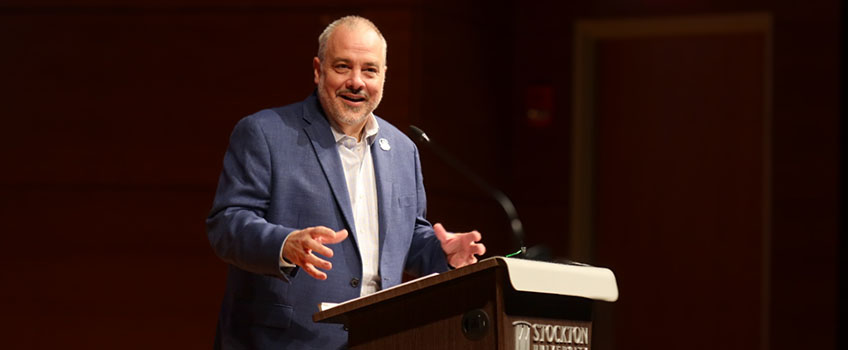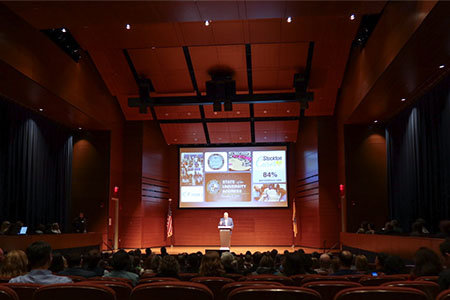Bertolino Outlines Plans to Be South Jersey’s College of Choice

President Joe Bertolino outlines his institutional priorities at the State of the University address Nov. 12.
Galloway, N.J. — President Joe Bertolino highlighted accomplishments from the previous year and focused on the needs ahead as he laid out his vision for Stockton in his second annual State of the University address on Nov. 12.
“I set out in my first year to truly listen to our community, and saw our campus come alive with the energy of students, faculty and staff. Every conversation I have, every story I hear, deepens my admiration for Stockton,” Bertolino told the audience of faculty, staff and students.
He shared institutional highlights from each department during the past year before outlining his priorities that would lay the foundation for Stockton to become the college of choice in South Jersey, recognizing both internal and external challenges facing the university.
“Higher education institutions across the nation, the Northeast and, yes, New Jersey, are experiencing a series of compounding challenges. We must continue to work diligently to ensure our own success,” he said. “In this time of rapid change, increasing competition and the need to be more nimble, it is important that we focus our work on the areas most critical to Stockton’s future success.”
Enhance Culture & Climate
 “No matter how great the plans, no matter how lofty and exciting the goals, we cannot
fully accomplish them without a healthy culture and campus climate that is inclusive,
supportive, participatory and well-informed about our challenges, opportunities and
the forces that are impacting higher education, New Jersey and Stockton.
“No matter how great the plans, no matter how lofty and exciting the goals, we cannot
fully accomplish them without a healthy culture and campus climate that is inclusive,
supportive, participatory and well-informed about our challenges, opportunities and
the forces that are impacting higher education, New Jersey and Stockton.
“I’ve said this to you from day one. And I will keep saying it. Stockton can only reach its goals and fully live out its mission with a strong faculty and staff who believe in the direction we are headed, equipped with the tools they need to be successful in their roles and ready to make the necessary shifts to position us for the future,” Bertolino said.
Complete the Strategic Plan
This year, Stockton embarked on a new strategic planning process, which will ultimately provide clear priorities and align resources with mid- and long-term goals.
“Our working groups are hard at work. They are centered on mission, vision and values; a review of the current strategic plan; communications; and a strategic planning framework under the guidance of American Association of State Colleges and Universities,” Bertolino said.
“Our process is open and collaborative, focusing on a shared governance approach to lay out a plan that the community supports and is excited about. For the plan to be successful, we need all of you to be engaged,” he told the audience.
Atlantic City
President Bertolino emphasized the university is working out a plan for the future of the Atlantic City campus, following recommendations from both the Presidential Task Force on Atlantic City Expansion and the Atlantic City Strategic Plan Working Group.
As I laid out in my inaugural address, Stockton’s vision to be the college of choice in South Jersey is essential not only for our institution but for the vitality of our local and regional communityPresident Joe Bertolino
“We are looking to make Atlantic City the home for graduate, professional, adult and continuing education. As part of this process, we are considering the potential to grow programs in Business and graduate education—areas like the MBA, MSW and Ed.D. could see expansion. We’re also exploring continuing education options that cater to working adults, as well as pre-professional programs that equip students for the workforce,” he said.
Achieve Financial Sustainability
Bertolino thanked faculty and staff for their work on achieving financial sustainability throughout the past year, noting, “Stockton remains in a much better position than many other public regionals in the Northeast. While we must take steps to address the challenges facing higher education, especially public regionals, we have resources in place to aid us in this process, thanks to the foresight of my predecessors and our Board of Trustees. Our financial reserves remain strong.”
Emphasizing the responsibility to ensure Stockton’s future financial sustainability, Bertolino outlined measures the university will continue, including:
- Careful review of open positions
- Ongoing review of current processes and systems to achieve greater efficiency
- Implementation of a financial aid optimization tool for the fall 2025 recruitment cycle
- Review of program viability
- Exploration of ways to increase revenue, including enrollment, grants, partnerships, philanthropic contributions and other funding sources.
Additionally, Stockton is piloting a winter term during January 2025 as an extension of the spring semester. If successful, this will move to a separate, tuition-revenue-generating winter term in 2026.
Stabilize Enrollment
Reminding all in attendance they play a role in recruitment and retention, Bertolino said the university saw a 5% decrease in first-year enrollment this fall, while marking a 1% increase in transfers and 10% increase in new graduate students.
“I’m pleased to share more positive news: Stockton continues to strengthen its commitment to diversity. This fall, we’ve seen an increase in diversity among both our first-time students and overall enrollment. Our 2024 cohort is 49% students of color, and our total student body is now 42% students of color. These numbers reflect our commitment to creating an inclusive environment where all students feel seen, heard and supported.
“We also experienced other shifts. The percentage of first-year students receiving Pell Grants increased from 41% in 2020 to 51% in 2024. This increase signals a shift toward a larger population of low-to-moderate income students choosing Stockton. We are re-aligning our need-based and scholarship financial aid packages to be more competitive.
📽️ WATCH: Full President's State of the University Address
“Even as the enrollment cliff looms, with nearly one-third of high school students enrolling in college leaving the state, I believe that we can do better. To stabilize and right-size, we must regain our market share. There is an interim plan in place and new actions are being implemented to better position us for next year,” he said.
“By the end of the strategic planning process, we will have a much better sense of how we will focus and maximize all our assets including facilities and human resources,” he said.
Ensure Academic & Student Success
Bertolino highlighted the roll out of Ospreys Navigate, a tool designed to strengthen collaboration between faculty and staff, providing holistic support to students.
“By enhancing communication and coordination, it aims to boost persistence and completion rates while identifying and addressing equity gaps. This is a critical step toward ensuring that every student has the support they need to succeed,” Bertolino said. “The earlier we recognize a problem, the sooner we can connect students with the right resources.”
Improve Internal & External Communication
“Part of our commitment to this community is to improve communication at all levels. I believe that transparency is the cornerstone of building trust,” he said. “To that end, we have challenged ourselves, and we challenge all of you, to make communication a priority. Think about how the decisions you make impact others and their work. Identify new ways for information to be shared. And share your feedback in forums like this one.”
Bertolino also highlighted efforts to strengthen the university’s role as an anchor institution by sharing how Stockton contributes to regional development and inviting local residents to engage with Stockon through events, partnerships and volunteer programs.
“As I laid out in my inaugural address, Stockton’s vision to be the college of choice in South Jersey is essential not only for our institution but for the vitality of our local and regional community,” he said.
“To be the college of choice in the region, we must strengthen our partnerships with school districts and community colleges throughout the region and the state. We must increase our yield of students that participate in our dual enrollment programs. We must grow in-demand programs and must be innovative in creating programs that set students on a successful path for their future and the future of our region and state. We must create alternate paths for degree completion that are flexible and respect who are students are and where they are at. We must grow our graduate programs. We must create international paths and opportunities. We must strengthen our presence and service to our community. And we must recommit to being an economic driver in our community,” Bertolino said.
“By the end of the strategic planning process, we will have a much better sense of how we will focus and maximize all our assets including facilities and human resources,” he said.
--Story by Stacey Clapp
--Photos by Lizzie Nealis


